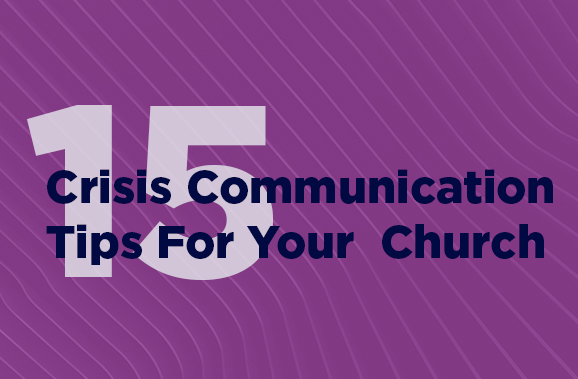
Written By: Dave Travis
Strategic Counsel to Pastors & Church Boards
The news and our personal conversations are now being fully monopolized by the coronavirus. The media seems to be promoting a culture of fear. It is one thing to have a healthy respect for illness and what it can do to our lives. We should do that. And be wise in preventive measures. However, as believers, fear should never be our response. The Bible contains 365 references to God telling His people to “fear not.”
Additionally, because of our faith in a mighty God, we should be the people, as Kipling said, “who keep their heads when all around are losing theirs.” We should be a model to the world on how to respond.
We’ve put together 11 ideas for your church to consider in a time in which our communities are in a heightened state of fear and concern.
- Change Your Mindset
When our community is in a state of fear and uncertainty, this should be seen as a great opportunity for ministry rather than a crisis to be feared. We have a marvelous opportunity to speak in terms of our hope and confidence in God through this season. Those that address the issues in reality but make a plan to hold up how the Gospel permeates our behaviors, ministries, and hope in Christ alone will prosper. Fear is mostly a psychological, emotional, and spiritual battle and you have the opportunity to offer comfort to your community. - Seek Facts
First realize that while there is hype and there is truth to the general concern, most of the fear can be overplayed. It is important to seek accuracy over quick information. Sources such as CDC and WHO should be your ultimate source for facts. It is important to not share inaccurate information and unconsciously spread misinformation. Stick with the facts and follow the direction of experts and leadership. - Economic Impacts to Consider
The economic impacts, due to the nature of the contagion and its spread, could have negative impacts across the world. This is a key disruption of the supply chain system for products from around the world. Many other industries like travel, conferences, and the like will be impacted. Central bankers will pump into the system some money to alleviate impact, but the economy, and your people, will not be totally spared.
In these times of economic distress, members of your community may seek assistance and support from their local church. Counselors, support groups, and benevolence are all opportunities for you to be a resource.
This could also be an opportunity to establish a crisis needs fund. Many will be out of work and miss paychecks, students who rely on school programs for meals will go without, and while we don’t encourage multiple giving channels on a regular basis, if the purpose is wide enough, it could attract special gifts to serve the needs of a wide range of people in crisis.
- Take Precautions To Protect the Vulnerable
This includes communicating clearly the different ways to greet people (elbow bumps), highlighting hand sanitation stations, reminding parents about sick children policies, etc. Although, these may have little impact on the virus spread, they can instead act as psychological reinforcement that the church understands and cares, and is taking the congregation's health and concerns seriously.
Several churches are setting up task forces with medical professionals to announce slight changes. This is an example of a "Short Term Activated Team.” These types of action steps ensure your congregation is informed and shows them you are being proactive. - Move to Smaller Service Gatherings
If the government requests large gatherings be suspended, this will mainly impact those that gather over 250 people at one place and time. The opportunity here could be to break up the congregation into multiple services spread throughout a weekend. If this does happen, have a plan and communication strategy prepared and ready to deploy. Reinforce that this is not a time to not gather due to fear, but to rally together to love and serve one another and our community. - Go Digital
This is also an opportunity to expand your online efforts. Many will use simple streaming tactics but this is also an opportunity to pilot multiple online, digital communication strategies that keep people connected and encouraged. This first starts in worship streaming. Check out this article from Portable Church featuring livestream kits.
An alternative to investing in livestream equipment would be to partner with another local church who does have the livestream capabilities. You can instead use those funds to serve your neighbors who will be facing economic hardship in this time.
- Tap into your Small Groups
If your church decides to not hold any weekend gatherings, the next best step is to encourage small groups in homes to gather, view a stream, and have some sermon-based discussion content. This means mobilizing many host homes willing to host gatherings, post locations, and training for hosts potentially also done online. The opportunity here is to expand your current small group system in a rapid way. Next step is to mobilize a team to establish a plan should this option be needed. - Giving
During times of crisis, giving is undoubtedly affected. Use this as an opportunity to increase regularity in congregant’s stewardship.
“Our ministries continue and our missionaries still need support through this season of irregular meeting. We are still in need of loyal stewards who will walk with us through thick and thin.”
Your church may already be using online giving, this is a great time to remind your church how easy it is to set up and use. Prepare an easy step-by-step guide for utilizing your online giving as well as setting up recurring giving and include it in your communications.
If you are still holding services, brainstorm alternative solutions to “passing the plate” that are less “hands on.”
- Ministry Through Congregants
This is a great opportunity to get your congregants focused on caring for friends, neighbors, and coworkers. “As you find people impacted that we can serve, would you please let us know?” This reporting system could be met with the response of many possibilities.
First, getting that front line friend to take responsibility for ministering to the family impacted through practical measures of concern. Second, in pastors making phone calls or even visits to those impacted. “I am the pastor of xyz church and your friend Mrs. X says you are ill with the virus. How can we pray for you? We think you matter to the world and to God. Can I add you to my regular prayer list.” Then frequent follow up calls and touches are appropriate. This will be a time to BE BOLD in sharing the gospel.
Boldness rules and Christians have always led the way in times of disaster or crisis as we focus on our hope in the Lord and His providence for us. - Alternative Engagement
Consider engagement tactics beyond the normal
Increase in smaller prayer and worship nights for a month where congregants are invited by alphabet to attend a worship/prayer night on every night of the week. Example – if your last name is A-D please attend our special MONDAY service, if E-J attend TUESDAY, etc.
- Bulk up a special Spotify playlist of worship songs focused on God’s presence, healing, and salvation. Share it widely via social media.
- Consider a “daily dose” audio podcast that is a daily message of prayer, affirmation, and teaching. (2-5 minutes)
- Utilize Instagram and Facebook Live techniques to stay connected with your congregants. - Prepare for Schools Closures
As schools close and move online, this is also a good opportunity to reach out to parents and children with online alternatives.
Consider worksheets with short videos, even story times as age appropriate, for a 15 or 30 minute “lesson” each day. Again, take the opportunity to build a more regular pattern of engagement. Distribute via email and social media and encourage your parents to share with other parents.
In conclusion, if I may be so bold, pray for revival! Crises can also lead to revival. I will never forget the day I witnessed over 400 people being baptized on one day right after September 11, 2001 at a church with a strong military presence. People realized they needed God and were turning to His church for answers. This could be a marvelous harvest season if we respond not from fear but with boldness.
Here are other great articles to help you and your ministry during this time:
COVID19 - A Response Through The Lens of Generosity
15 Crisis Communication Tips for your ChurchFree Training and Checklists to Prepare Your Church for the Coronavirus
Love in the Time of Coronavirus: A Guide For Christian Leaders
Coronavirus & Simple Setups to Live Stream Church Services
Share this
You May Also Like
These Related Stories

Can We Please Stop Using the Term “Under Compulsion” When It Comes to Giving?
-1.png)
Top 10 pieces of Advice for Boards in Succession Plans


No Comments Yet
Let us know what you think